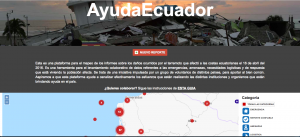
Early on the morning after the devastating earthquake of 16 April, a group of hacktivists in Ecuador and abroad got to work to find the best way to channel the assistance needed in different parts of the country, a task that became increasingly urgent as the number of victims continued to rise. They immediately thought of Ushahidi, an open-source information-gathering platform that has provided assistance in crisis and emergency situations since 2008. Over the past days, hundreds of people have used the Ecuador Disaster Map to report needs, requests and offers of help through mobile phone text messages, email or the web, contributing to a crowdsourced map of the situation on the ground. APCNews spoke with Valeria Betancourt, the head of the APC Communications and Information Policy Programme and one of the organisers of the crowdmapping initiative.
“We considered a number of other alternatives but we decided on Ushahidi because it’s a free/libre and open source software (FLOSS), which meant we could adapt it to the concrete needs of the emergency in Ecuador,” explained Betancourt. She and the other initial organisers passed on their proposals to Internet Libre, a collective of groups and individuals in Ecuador who work on issues of human rights online, as well as contacting the Ushahidi international team for support and advice.
An initial team of volunteers was formed to get the platform up and running, providing a means of quickly and efficiently gathering, sharing and visualising information on “emergencies, threats, logistical needs and responses.” The affected populations themselves provide the information from disaster-stricken areas, a key factor for providing information to the authorities and helping them to more effectively organise their response and assistance measures.
“The number of volunteers inside and outside the country continues growing daily and there are currently three teams operating – technical, verification and liaison teams – supported by a coordinating team,” said Betancourt. “We have received significant support from the international Ushahidi community and the Standby Task Force, which is made up by volunteers with technical expertise and experience in emergencies like the earthquakes in Nepal, Haiti, Chile, New Zealand and Japan, the Ebola crisis, the crisis in Libya, and the floods in Colombia and Pakistan. The Humanitarian OpenStreetMap Team (HOT) has also been involved, processing satellite images and creating useful maps with the participation of volunteers from all around the world.”
Combined with this technical expertise are the contributions of individuals from specialised civil society organisations and UN agencies who are familiar with the platform and are lending support both in the affected area and from abroad. “Solidarity from inside and outside the country is making a huge contribution,” said Betancourt, who continues to pour her energies into confronting what has become the largest earthquake in decades.
“Coordination with the public and government institutions responsible for dealing with the emergency is a priority, and the initiative is working to ensure that the platform serves to support the relief efforts in the areas affected as effectively as possible. The whole idea is to use our digital activism to get real help to the people who need it,” she stressed.